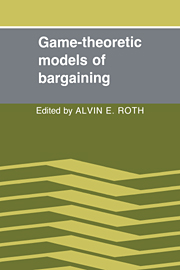Book contents
- Frontmatter
- Contents
- List of contributors
- Preface
- Chapter 1 Editor's introduction and overview
- Chapter 2 Disagreement in bargaining: Models with incomplete information
- Chapter 3 Reputations in games and markets
- Chapter 4 An approach to some noncooperative game situations with special attention to bargaining
- Chapter 5 Infinite-horizon models of bargaining with one-sided incomplete information
- Chapter 6 Choice of conjectures in a bargaining game with incomplete information
- Chapter 7 Analysis of two bargaining problems with incomplete information
- Chapter 8 Sequential bargaining mechanisms
- Chapter 9 The role of risk aversion in a simple bargaining model
- Chapter 10 Risk sensitivity and related properties for bargaining solutions
- Chapter 11 Axiomatic theory of bargaining with a variable population: A survey of recent results
- Chapter 12 Toward a focal-point theory of bargaining
- Chapter 13 Bargaining and coalitions
- Chapter 14 Axiomatic approaches to coalitional bargaining
- Chapter 15 A comment on the Coase theorem
- Chapter 16 Disclosure of evidence and resolution of disputes: Who should bear the burden of proof?
- Chapter 17 The role of arbitration and the theory of incentives
Chapter 1 - Editor's introduction and overview
Published online by Cambridge University Press: 23 September 2009
- Frontmatter
- Contents
- List of contributors
- Preface
- Chapter 1 Editor's introduction and overview
- Chapter 2 Disagreement in bargaining: Models with incomplete information
- Chapter 3 Reputations in games and markets
- Chapter 4 An approach to some noncooperative game situations with special attention to bargaining
- Chapter 5 Infinite-horizon models of bargaining with one-sided incomplete information
- Chapter 6 Choice of conjectures in a bargaining game with incomplete information
- Chapter 7 Analysis of two bargaining problems with incomplete information
- Chapter 8 Sequential bargaining mechanisms
- Chapter 9 The role of risk aversion in a simple bargaining model
- Chapter 10 Risk sensitivity and related properties for bargaining solutions
- Chapter 11 Axiomatic theory of bargaining with a variable population: A survey of recent results
- Chapter 12 Toward a focal-point theory of bargaining
- Chapter 13 Bargaining and coalitions
- Chapter 14 Axiomatic approaches to coalitional bargaining
- Chapter 15 A comment on the Coase theorem
- Chapter 16 Disclosure of evidence and resolution of disputes: Who should bear the burden of proof?
- Chapter 17 The role of arbitration and the theory of incentives
Summary
There are two distinct reasons why the study of bargaining is of fundamental importance to economics. The first is that many aspects of economic activity are influenced directly by bargaining between and among individuals, firms, and nations. The second is that bargaining occupies an important place in economic theory, since the “pure bargaining problem” is at the opposite pole of economic phenomena from “perfect competition.”
It is not surprising that economic theory has had less apparent success in studying bargaining than in studying perfect competition, since perfect competition represents the idealized case in which the strategic aspect of economic interaction is reduced to negligible proportions by the discipline of a market that allows each agent to behave as a solitary decision maker, whereas pure bargaining is the case of economic interaction in which the market plays no role other than to set the bounds of discussion, within which the final outcome is determined entirely by the strategic interaction of the bargainers. The fact that the outcome of bargaining depends on this strategic interaction has led many economists, at least since the time of Edgeworth (1881), to conclude that bargaining is characterized by the indeterminacy of its outcome. In this view, theories of bargaining cannot, even in principle, do more than specify a range in which an agreement may be found; to attempt to accomplish more would be to introduce arbitrary specificity.
- Type
- Chapter
- Information
- Game-Theoretic Models of Bargaining , pp. 1 - 8Publisher: Cambridge University PressPrint publication year: 1985
- 1
- Cited by

